ANDROS
Religion

Religion
Popular destinations GREECE
| Aegina | Alonissos | Andros |
| Chios | Corfu | Crete |
| Hydra | Kalymnos | Karpathos |
| Kefalonia | Kos | Lefkas |
| Lesbos | Mykonos | Naxos |
| Paros | Patmos | Peloponnese |
| Poros | Rhodes | Samos |
| Santorini | Skiathos | Skopelos |
| Spetses | Thasos | Zakynthos |
Religion
General
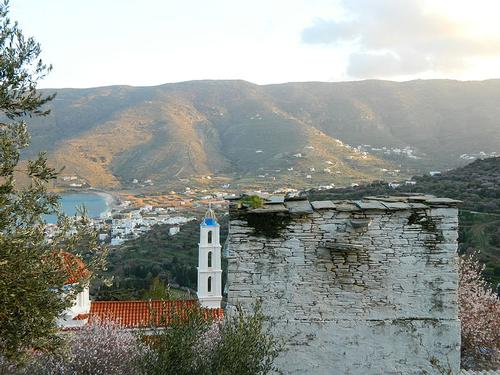 Hidden church AndrosPhoto: Public domain
Hidden church AndrosPhoto: Public domain
Andros is home to a large number of Byzantine churches and monasteries. Their beautiful architecture, large size and impressive mosaics testify to a great development in the 11th and 12th centuries. The 14th century Zoodóchou Pigis (the source of life) is Andros's largest monastery, located in the village of Batsi west of the capital Chora. Well protected by strong walls, almost like a fortress, the monastery offers a great view, has a library with special books and manuscripts and is open to the public. The white church of Panagia Theosképasti (protected by God) from 1555, dedicated to Mary, towers over the port of Andros. The chapel of Panagia Thalassini, considered the symbol of Andros, is built on top of a rock.
Papachrantos Monastery is one of the oldest monasteries in Andros with beautiful architecture . Remarkably well preserved are the 13th century monastery Agios Nikolaos and Panagia Tromarchiani. The Monastery of Agios Nikolaos, where a number of monks still live, is home to special books, religious artifacts and beautiful embroidered fabrics, and the church has a magnificent throne and a sculpted iconostasis.
Short description of other religious buildings. on Andros
Apikia
-Chapel of Agios Nikolaos, part church, part cave, carved out of a steep rock face
Chora
-Panagia Palatiana church from the 13th century and restored in the 17th century, located within the ruins of the Venetian fortress
-Aghios Georgios cathedral with many vows
Falika
-MoníPanachrántou (Immaculate Conception), spectacularly located on Mount Katafigio to the southwest of Chora, where the skull of Agios Panteleïmon is kept, founded in 961 by Nikiforos Fokás, later Byzantine soldier-emperor Nikephoros II Phokas (ca. 912-ca. 969)
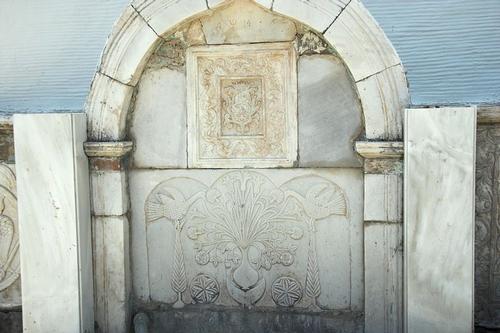 Andros Fountain of the Church in MenitesPhoto: Zde CC 4.0 International no changes made
Andros Fountain of the Church in MenitesPhoto: Zde CC 4.0 International no changes made
Ménites
-Panagia i Koumoulos (Virgin of the Plentiful), beautifully restored church, probably built on the site of a Dionyso temple in earlier times
Mesariá - Taxiárchis church: Byzantine church, built by the Byzantine emperor Manuel I Komnenos (1120-1180) in 1158
Steniés
-Agios Georgios church, with murals from the years thirty of the last century by Konstantinos Mavropoulos
Greek Mythology
The word myth is derived from the word "muthos", which first meant expression and was later often interpreted as "a spoken or written story".
Mythology (muthologia) is thus "telling stories", or a collection of myths, or the study of myths.
When writing originated in Greece, myths and legends were already anchored in oral traditions and later poets in particular gave the stories a different course. Greek mythology is very similar to other mythologies. For example, the Norse god Odin corresponds to the Greek Zeus and the Norse heroes often performed the same heroic deeds as their Greek colleagues.
Some Greek gods
Aeolus (Aiolos)
A son of Hippotes, who was appointed by Zeus as guardian of the winds. He was in charge of the (wind) gods: Boreas, Zephyros, Notos and Euros.
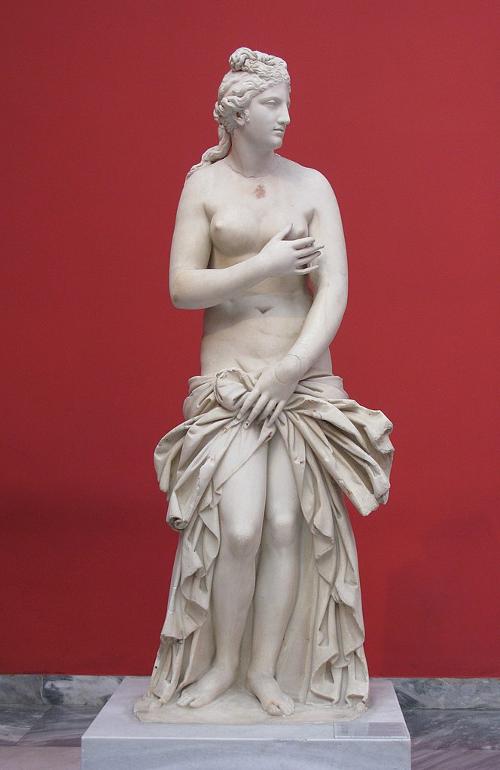 Aphrodite, goddess of love and beautyPhoto: Tilemahos Efthimiadis CC 2.0 Generic no changes made
Aphrodite, goddess of love and beautyPhoto: Tilemahos Efthimiadis CC 2.0 Generic no changes made
Aphrodite
Aphrodite is the goddess of love and beauty. She was born from the foam of the sea, where the main shrine dedicated to Aphrodite is located. She was married to Hephaestus, but preferred Ares for a lover.
Her son was Eros, the god of love. Aphrodite is picturedeld with the winged Eros and with pigeons. She was one of the Olympian gods. The Romans called her Venus.
Apollo
Apollo was the son of Zeus and Leto, and twin brother of Artemis. He is god of light, of medicine, music and science. Apollo is often depicted with a lyre in his hand. The main shrine dedicated to Apollo is located in Delphi, the most important oracle site of ancient Greece. Apollo was an Olympian god.
Ares
Ares was a son of Zeus and Hera and is the god of war. He is often depicted in full armor and was an Olympian god. The Romans take him Mars.
Artemis
Artemis was the twin sister of Apollo and daughter of Zeus and Leto. She was the goddess of nature and the hunt. She was also the tutelary goddess of pregnant women and is often depicted with a bow in her hand. She was an Olympian god and her Roman name is Diana.
Dionysos
Dionysos was a son of Zeus and the god of grapes and wine. He is often depicted with a staff that is wrapped at the top with ivy leaves. He was an Olympian god and his Roman name is Bacchus or Liber.
Eros
Eros is the god of needs and is also called Himeros. Eros is often seen as a winged boy god who shoots men in the heart with love arrows. Roman names for him are Amor and Cupid.
Hermes
Hermes was the messenger of the gods and a son of Zeus. He is also god of travelers, thieves and merchants. He is always depicted wearing a travelers' hat and staff or a helmet with wings. His sandals also have wings. He escorted the ghosts of the dead to the underworld, Hades.
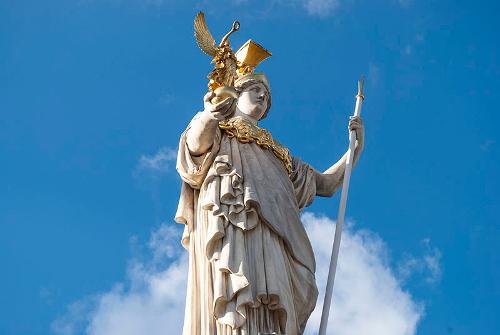 Pallas AthenaPhoto: Diana Ringo CC 3.0 Austria no changes made
Pallas AthenaPhoto: Diana Ringo CC 3.0 Austria no changes made
Pallas Athena
She is the daughter of Zeus only, because she is born from his forehead. She is the patron goddess of the artists and craftsmen, but also the goddess of wisdom and knowledge. In wartime Athena was also revered as a war goddess. She was the special patron goddess of the city Athens and a guardian angel of Greek heroes such as Herakles and Odysseus.
She is often depicted wearing helmet and full armor. The owl, which symbolizes wisdom, was devoted to her. Pallas Athena has a sanctuary located in Athens: the Parthenon.
She was an Olympic god and her Roman name is Minerva.
Poseidon
Poseidon is a helm of Zeus and is the god of the sea and guardian god of the sailors. His palace is deep under water and he is often depicted with a trident, with which he can stir the sea. The horse was dedicated to him.
Because the Greeks believed that the land floated on the sea, they also regarded him as the god who caused the earthquakes. Its Roman name is Jupiter.
Zeus
Zeus was the supreme god of the Greeks and the king of gods and men. He was also the god of the sky and the weather. He is often depicted with a lightning in his hand and is seated on a throne. Many demigods and heroes, such as Hercules and Perseus, have emerged from his love affairs with beautiful women.
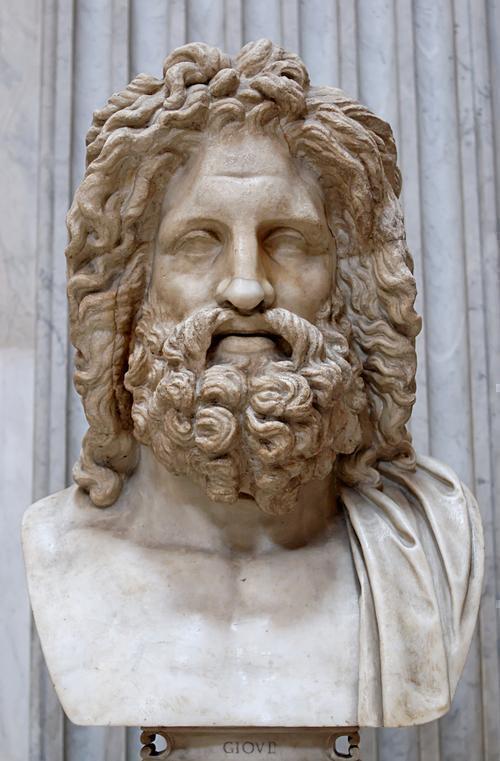
Sources
Dubin, Marc / Griekse eilanden
Van Reemst
Greek islands
Lonely Planet
De Griekse eilanden
Lannoo
Leistra, Machteld / De Griekse eilanden
Gottmer/Becht
McGilchrist, Nigel / Greece : the Aegean Islands
Somerset Books
Midgette, Anne / Griekse eilanden : Egeïsche Zee
Het Spectrum
CIA - World Factbook
BBC - Country Profiles
Copyright: Team The World of Info